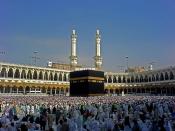Torah -(Hebrew, "law" or "doctrine"), in Judaism, the Pentateuch, especially when in the form of a parchment scroll for reading in the synagogue. The Torah is the cornerstone of Jewish religion and law.
Mishnah, first part of the Talmud, a codification of the oral law of the Old Testament and of the political and civil laws of the Jews. It was compiled and edited (orally) in the last quarter of the 2nd century ad or the first quarter of the 3rd century by Rabbi Judah (circa 135-c. 220), known as ha-Kadosh (Hebrew, "the Saint") or ha-Nasi (Hebrew, "the Prince" or "the Patriarch"), but generally known to devout Jews simply as "Rabbi."
Talmud, body of Jewish civil and religious law, including commentaries on the Torah, or Pentateuch. The Talmud consists of a codification of laws, called the Mishnah, and a commentary on the Mishnah, called the Gemara. The material in the Talmud that concerns decisions by scholars on disputed legal questions is known as the Halakhah; the legends, anecdotes, and sayings in the Talmud that are used to illustrate the traditional law are known as Haggada.
Talmud, body of Jewish civil and religious law, including commentaries on the Torah, or Pentateuch. The Talmud consists of a codification of laws, called the Mishnah, and a commentary on the Mishnah, called the Gemara. The material in the Talmud that concerns decisions by scholars on disputed legal questions is known as the Halakhah; the legends, anecdotes, and sayings in the Talmud that are used to illustrate the traditional law are known as Haggada.
Four Noble Truths (Sanskrit Catvari-Arya-Satyani), the four fundamental principles of Buddhism, expounded by the Buddha, the founder of Buddhism, after his enlightenment in the 6th century bc. The first truth is the Holy Truth of Suffering: All existence is suffering (dukkha).


